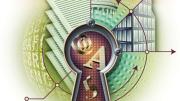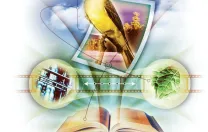Looking at cyberspace from 50,000 feet, we are going to be choosing between two alternative worldviews. In one view of the world, information ubiquity is the natural state; the bits will always leak. There are digital tools, such as encryption and anonymous routing, to make the flows of bits less dangerous to us and less conducive to surveillance and commercial exploitation. But fundamentally, in this worldview, people must be responsible for themselves. They need to learn homespun safety lessons: Don’t give away data about yourself if you don’t want it abused. Don’t believe what you read on a Web site if it’s anonymous and can’t be traced. Don’t believe that anyone, even the government, can collect vast amounts of information and keep it all secret forever.
In this worldview the most important thing society can do is to teach people how to take care of themselves, how not to overreact to misfortunes, how to capitalize on the potential of the revolution without assuming its risks.
In the alternative view, information, for all its usefulness, is a fundamentally dangerous substance. It must be bottled up, dammed, diverted, and origin labeled, or packaged and sold for money, even if it is a century old. This is the world of 1984, except that the information sources are in private hands, not just government hands, and the information users are commercial as well as governmental. This is the world in which the response to every problem is a regulation, or an agency, or perhaps a hardware feature. This is the world of Green Dam spyware and censorship software—China’s modern Index Librorum Prohibitorum. It is also the world of central Internet monitoring in Australia (for obscenity) and France (for copyright infringement, in spite of the provision in Article 19 of the UN General Assembly’s 1948 “Universal Declaration of Human Rights” to “receive and impart information and ideas through any media and regardless of frontiers”). It is the world in which the most open societies use the tools of the most repressive, and citizens of democracies are grateful for the safety and prosperity they are promised.
Commercial and governmental forces make it easy to forget how much power we have over how technologies will shape our future. All of us who live in free societies share that power, and especially the young, who can decide what kind of world they want to inhabit.
We can help make that choice through the political process, by watching what laws are enacted by state and national governments. We can help make it by our choices as consumers, by what we say about the features present in, and missing from, the devices and technologies we buy. We can make it by what we have to say about the workings of the institutions and businesses of which we are a part. We can resist those expurgated dictionaries and those Web sites that want to know things you do not want to tell them. We can speak up. We can leave the box on the shelf. We can click “I don’t agree.”
Whatever we choose, we should not let one world or the other evolve because others—especially governments and corporations—have made the choice for us. The revolution has its delights, but we need to think beyond them—think how they work, who has the data, and what they can do with it. We need to use our rationality, our knowledge, and our education to shape the world in which we and our children and our children’s children will live.
Adapted from The Harvard Sampler: Liberal Education for the Twenty-First Century, edited by Jennifer M. Shephard, Stephen M. Kosslyn, and Evelynn M. Hammonds, to be published October 2011 by Harvard University Press. Copyright © 2011 by the President and Fellows of Harvard College. All rights reserved.







